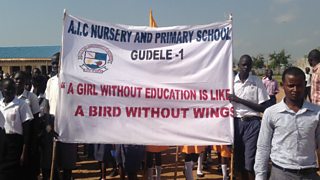
AIC Nursery and Primary School celebrating South Sudan’s National Girls’ Education Day
In a country where only one in ten girls complete primary education, Trish Doherty looks at how a Βι¶ΉΤΌΕΔ Media Action radio programme is helping more girls stay in school in South Sudan.
“A girl without education is like a bird without wings”
So read the banner held by pupils of AIC Nursery and Primary School as they marched onto the pitch set aside for the celebrations of South Sudan’s National Girls’ Education Day. Held at Gudele East Primary School, the event was both a celebration of girls’ education and the launch of the first ever .
In a country where only one in ten girls complete primary education and even fewer a secondary education, the strategy’s emphasis on girls’ education is paramount.
Launched by the government with support from UNICEF and key education organisations, the strategy aims to remove barriers that prevent girls in South Sudan from going to and staying in school and includes plans to promote girls’ education, make education affordable and provide a gender sensitive curriculum.
Transforming lives through education
Watching the children of primary schools from across the area perform songs, dances and dramas about the challenges they face in going to and staying in school, and the pride they have in their own education, I reflected on the changes that Βι¶ΉΤΌΕΔ Media Action’s radio programme is making to lives of people across South Sudan. is a 15 minute factual radio programme that includes real life stories of girls, their families and schools to highlight the benefits of girls staying in education. The show forms part of the , which seeks to transform the lives of a generation of children – especially girls – through education.
In 2014, within four months of its first broadcast, reached an estimated 946,000 people aged 15+ in South Sudan. Since then we have seen real stories of change among listeners. For example, 19 year old William Okeny from Juba, who, after hearing the Our School programme, said he changed his attitude towards the division of household chores:
“One time I tune on my radio it was Our School programme and the topic was supporting girls at home… it was really touches me [and] encourages me to come up with a choice of helping my sisters at home with everything like cooking, sweeping [and] mopping.”
William talks about how 'Our School' inspired him to help his sister around the house, to help her concentrate on her school work.
Or 19 year old Teresa Mading from Kuajock, who, at 15, dropped out of school when she got married and had a family. Listening to Our School programme some years after the birth of her first child, Teresa was inspired to return to school.
“I first talked to my husband [and told him] that I had listened to the one of young mothers like me explaining over [the] radio that she had taken courage and returned to school while having young children like me.”
As pupils at the National Girls’ Education Day celebrations performed a drama on the importance of girls staying in school for themselves and their families, I noted how similar their fictional storylines were to William and Teresa’s real-life stories, and how much of a difference education will make for future generations.
Related links:
Follow Βι¶ΉΤΌΕΔ Media Action on and
